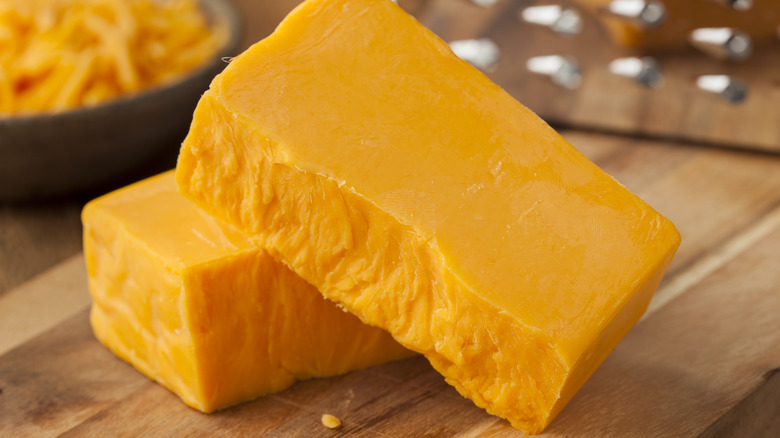This Little-Known American Cheese Has More Protein Than Meat
Vegetarians are well-familiar with this question from meat-eaters: "How do you get your protein?" Although vegans have to carefully plan their diets to ensure they get enough B vitamins and other nutrients found in animal products, vegetarians have plenty of protein sources that aren't meat, including dairy.
Let's look at the protein in meat. Four ounces of chicken breast provides 25 grams of protein, and 4 ounces of broiled lean beef flank steak offers 31.5 grams. Two scrambled eggs come in at 13 grams of protein, and 4 ounces of cooked wild Atlantic salmon will give you 29 grams of protein.
Now let's look at cheese. You might snack on an ounce of cheese, but it has a lot more protein than you'd expect. Feta has 16 grams of protein, Manchego has 24 grams, and French brie offers 23.6 grams for each 4-ounce serving. Not so bad. Yet ounce for ounce, the Michigan-made Pinconning cheese gives you a little more protein than chicken and just a little less than steak and salmon. You'll find that 4 ounces of Pinconning cheese has 28 grams of protein.
What is Pinconning cheese?
Wisconsin is well-known for its cheese, but people from Michigan will point to the small town of Pinconning as its state cheese capital. The Colby-style cheese was first made by Dan Horn in the early 1900s, and Horn's daughter began selling Pinconning cheese in Michigan's first cheese store.
While you might not want to eat 4 ounces of cheese in one sitting (or you might!), a single ounce of Pinconning cheese still provides plenty of nutrients. Keto dieters will love that 74% of Pinconning's 110 calories come from fat. Pinconning cheese is a good source of calcium, providing 15% of your daily recommended value. You'll also get 10% of vitamin B12, which is often deficient in a vegetarian diet. Cheese also has minerals such as phosphorus, zinc, and selenium. Remember that cheese is an essential protein, meaning it has high enough levels of all nine of the essential amino acids you need from food. Cheese also is high in cystine and tyrosine, which are two conditionally essential amino acids.
Is cheese healthy?
Those who are watching their saturated fat intake might pass on Pinconning cheese's 5.5 grams of saturated fat and 1 gram of trans fat, but a 2020 review in the Journal of the American College of Cardiology said that saturated fats from whole-fat dairy, unprocessed meat, and dark chocolate don't have the same risk of cardiovascular disease as other foods high in saturated fat. According to a 2016 review in the European Journal of Nutrition that included 15 studies, people who ate more cheese had a 10% reduced risk for cardiovascular disease and stroke and 14% lower risk for coronary heart disease.
Cheese might also have other health benefits aside from heart-related diseases, according to a 2023 review in Advances in Nutrition. Eating cheese is linked to an 11% lower risk of estrogen receptor-negative breast cancer and a 7% lower risk of type 2 diabetes. Cheese's calcium could be responsible for the 10% reduction in total bone fractures. When you eat cheese every day, you could lower your risk of dementia by 19%.


